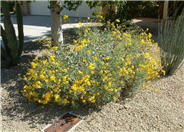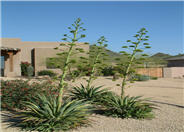
Common name:Chihuahuan Rosewood
Botanical name:Vauquelinia corymbosa angustifolia
Large shrub or small tree grows at a moderate to fast rate to 25'. Ascending somewhat twisting branches. Dense clusters of fragrant white flowers cover tree in spring. Resembles oleander without flowers. Good landscape potential. Spectacular evergreen foliage 6", long, narrow, sharply toothed, dark green. Native to Texas and northern Mexico.

Common name:Mexican Gold Poppy
Botanical name:Eschscholzia mexicana
Mexican Gold Poppy is similar to the California Poppy, but smaller. Upward-facing, four petaled orange blooms. Grows to 8" high. It is drought tolerant but extra summer water will extend the flowering season.

Common name:Mexican Palo Verde, Jerusalem Thorn
Botanical name:Parkinsonia aculeata
Light, airy tree with prickly stems and green bark. Very fast growing with sparse foliage & very long narrow leaves. Yellow flowers with orange red throats spring for at least a month. This is a messy and shortlived palo verdy. Usually found on limestone soils in areas with moisture but is strongly drought tolerant. Withstands saline conditions. Can be cold or drought deciduous.

Common name:Brittlebush
Botanical name:Encelia farinosa
Silvery gray mounding shrub grows to 3' x 4'. Yellow daisylike flowers appear winter to spring. Short lived individual plants but will reseed easily. Good for naturalistic landscapes. Rapid growth following rain. Overgrown and fragile if overwatered. Seeds attract birds. Native to Sonoran & Mojave deserts.

Common name:Smooth Agave
Botanical name:Agave desmettiana
Agave with an open rosette form grows quickly to 3' x 3'. Very attrative plant resembles Octopus Agave but smaller. Fleshy leaves are light green with smooth edges and a sharp tip. Will grow best in filtered sun or full shade. After several years flower stalk will appear with bright yellow flowersin spring. Like all agaves, it will die after flowering but produces an abundance of offesets.
Designer: Carol Stuttard, Homeowner
Photographer: GardenSoft
Practice grass-cycling by leaving short grass clippings on lawns after mowing, so that nutrients and organic matter are returned to the soil.
Remember to check your irrigation systems once a month, especially your valves, sprinkler heads, and drip emitters.
If your controller is not a smart controller, it should be reprogrammed as the weather changes.
Drip and other smart irrigation delivers water directly to roots, allowing no excess water for weeds.